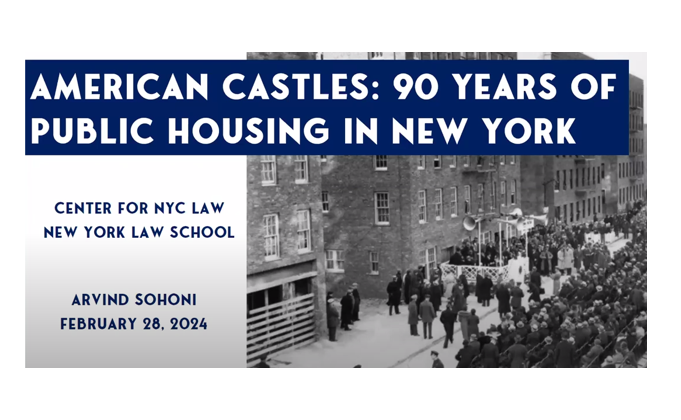Arvind Sohoni, EVP of Strategy & Innovation, Delivers New York Law School Lecture on Public Housing History
Arvind Sohoni, NYCHA’s Executive Vice President of Strategy and Innovation, delivered a lecture entitled American Castles: 90 Years of Public Housing in New York to an auditorium of students, professors, public housing officials, and residents at New York Law School on February 28.
The lecture traced a line from the development of the first 17th century European-style settlements in New York City to the birth of the tenement and public housing movement, before examining NYCHA’s early successes at the forefront of America’s ambitious public housing efforts. He then discussed the Authority’s subsequent challenges and their Transformation Plan-envisioned solutions.
Mr. Sohoni, who joined NYCHA in 2019, oversees NYCHA’s transformation efforts. This includes the restructuring of the Authority and exploration of new business models to sustain the core mission of housing low-income New Yorkers, which involves working closely with partners at the U.S. Department of Housing and Urban Development, the U.S. Attorney’s Office for the Southern District of New York, and an appointed Federal Monitor to implement the terms of a 2019 regulatory agreement.
In his lecture, Mr. Sohoni mapped the trajectory of New York City’s complex history with public housing, noting that federal disinvestment, and what he referred to as public housing’s negative “perception problem,” as key impediments to the development of more affordable housing which, as he noted, should not be “left alone to a supply-constrained market.”
Mr. Sohoni, reflecting afterwards on his speech, noted that NYCHA staff are highly engaged in making progress at the Authority.
“We still have a lot of work to do on fixing this place, too,” he said. “We have a lot of things to change around how do we manage effectively. How do we use public dollars efficiently? The money itself won’t fix those things – we have to fix those things.”
Despite the hurdles public housing faces in New York City, Mr. Sohoni remains optimistic about its future, and implored his audience to think about public and affordable housing in broader and more sustainable terms, such as additional government-funded affordable housing that could serve larger segments of the population. He pointed to other cities that have successfully provided affordable social housing to people in middle-income brackets, such as Paris, Vienna, and Singapore (where as much as 80 percent of the population lives in government-built housing).
As rents continue to soar nationwide, Mr. Sohoni sees shared interests and the possibility for new forms of solidarity between low- and middle-income renters, and hopes that public and social housing will adapt to meet these new realities.
Before taking questions from the audience, he ended his lecture with a direct address to the law school graduates in the room, urging them to consider a career in housing – whether it’s to work for NYCHA, a think tank, legal aid, or to advocate on behalf of residents who want access to more affordable housing. Housing, he pointed out, has become a “generational issue” in need of new ideas.
“There are a lot of things you can do – but come do this. You won’t regret it.”
Watch the full lecture here.







